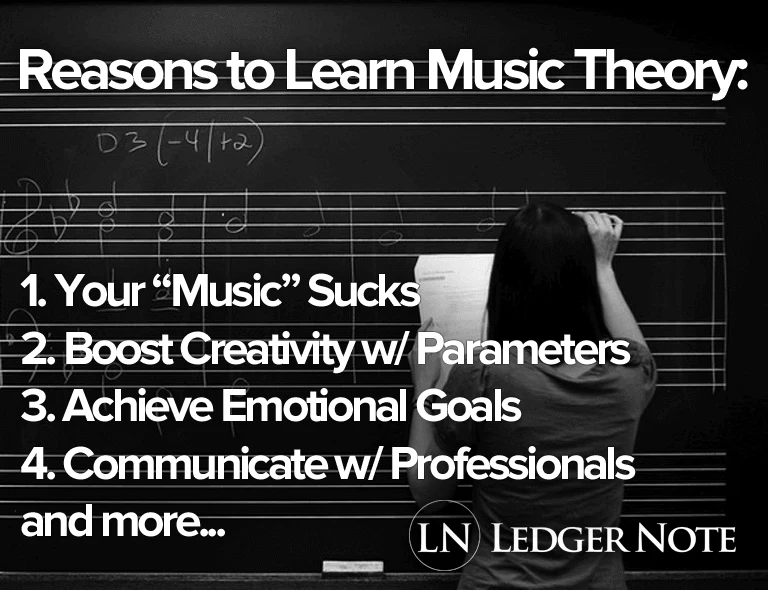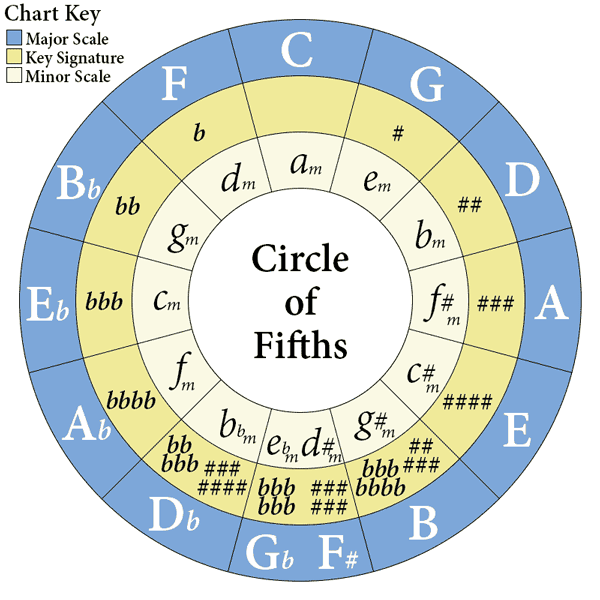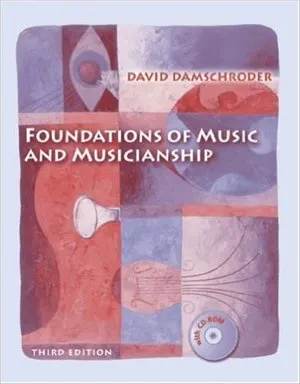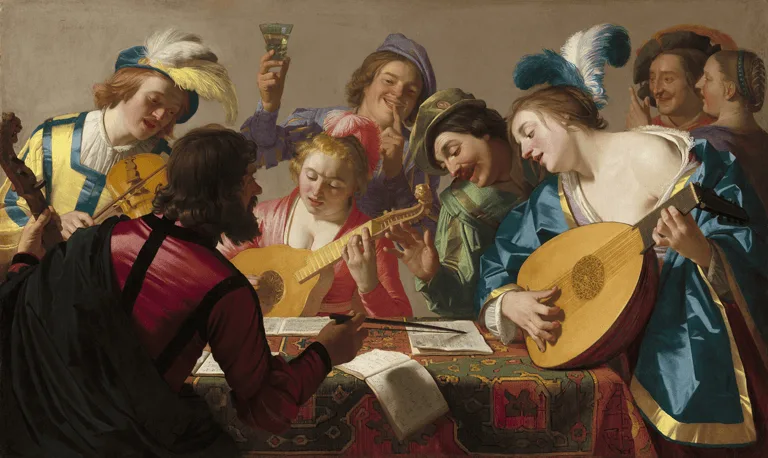
The more time you spend in the music industry, the more you’ll realize how few “musicians” even know the rudimentary fundamentals of music theory.
You’ll also pick up on the pattern of excuses, ranging from a load of crap about their free spirit being constrained to not wanting to sound like a jazz cello player when they just want to play roots reggae.
All of these rationalizations are really just ways of weaseling out of having to put forth effort or admitting they are intimidated.
The reality is that it takes more effort to learn a ton of songs through rote memorization than it does to understand the why and how behind the songs. Soon enough, you’ll begin to intuit the movements of songs, and god forbid, maybe even be able to write one of your own that doesn’t completely suck.
Honestly it’s partly our fault. Those of us who have studied music theory haven’t done a good enough job explaining how the rewards far outweigh the effort. We haven’t explained just how easy it all is either, maybe because we like sitting on our pedestals.
But the reality is that elementary school students around the world are slaying it while countless adults don’t even know that Every Good Boy Does Fine.
Fear not. At first you’ll have to ponder the concepts, sure. You’ll have to get frustrated as you translate them to your instrument and ledger lines.
But eventually it will “click” and you’ll start speaking the language fluently. Suddenly the amount of positive responses you get from listeners will increase and you’ll burst through plateau after plateau of expertise.
And if it’s any consolation, most genres actually require very little more than the extreme basics. You’ll be well on your way in no time. You’re probably not convinced, so let’s discuss some more reasons why you need to learn some basic music theory.
Your Music Needs to Make Musical Sense
Have you yourself or one of your listeners ever heard a part of your song and said “I don’t know why, it just doesn’t sound right. It doesn’t feel right”? That’s because we all know what makes musical sense when we hear it, whether or not we can put it on paper.
This is partially because we’ve been exposed to quality music all of our lives. The main reason is that music actually follows very specific mathematical laws encoded into the universe. Sure, things can be consonant or dissonant, but some things can downright just not belong.
When “it just doesn’t feel right,” that’s usually because you’re playing tones not in the key, you’re changing keys randomly, your rhythm isn’t locked into time, your chord changes are wrong or non-existent, etc.
There’s so many simple ways that amateurs goof up that can be avoided just by knowing their key signature, how chords work, and the circle of fifths. These are some of the core principals when you study music theory.

These mathematical relationships are what allows music to be music instead of random noise strung together in some sequence. When it follows the rules, it’s beautiful, organized, and pleasing to the ears.
When you know the rules, you can break them tastefully or even create or discover new methods and rules. But right now, you’re breaking them unknowingly and it sounds like crap to everyone but you and your enabling mother (“Oh, you’re doing so good, son. Come on down for dinner when you’re finished cleaning you’re room.”)
Having a grasp on the basics of music theory opens up a new world of opportunity for your songs. Your sense of rhythm will grow tighter, more precise, and more acute, allowing you access to 1/16th notes, 1/32nd notes, and even 1/64th notes.
You’ll begin to wow your listeners with syncopation, polyrhythms, alternate time signatures, triplets, and more. Suddenly your melodies will open on the right notes, develop intuitively, and close with leading tones resolving back to the start.
Your chord changes will sensibly take advantage of cadences and other conventions that allow your listeners a sense of familiarity and anticipation instead of wondering what the heck is going on.
I learned most of what I know about music theory in college. The professor didn’t do much for us but run us through this wonderful book in order: Damschroder’s Foundations of Music and Musicianship.

Sure, it’s not necessarily fun to complete the homework worksheets or practice identifying theory elements through listening to the included CD, but it got me very far. This book was very accessible. If you’re sharp (no pun intended!) you should be able to absorb it pretty quickly.
It Will Boost Your Creativity, Not Kill It
With a little effort up front in learning it, music theory is going to save you lots of time with trial and error, making your job easier while pumping out better results. These free spirit complainers are worried that “being locked down by rules set out by the man” will keep them from expressing themselves fully.
But when your expression is nonsensical, you’re not communicating your meaning anyways.
Creativity requires direction or it’s just chaos. And we’re not asking for much here. Listeners just need you to actually follow a scale, key, and a chord progression. That’s really all.
You can basically get away with anything else after that. What’s even better is that that all arises from your core creativity in writing the lead melody.
Once you have that established, the chords, chord inversions, chord progression, and harmonizations all are chosen out of the melody. And you still have more options than you could even explore.
Nothing forces creativity as much as having a set of tight parameters around you (which is why authors love working off of writing prompts and film directors enjoy contests with pre-written scripts).
Anyways, to squash this silly excuse for being lazy, there’s not a single musician out there that’s known for creativity that hasn’t followed the rules of the game…
Bjork, Beck, The Beatles, The Beach Boys, The Beastie Boys, Bela Fleck, Billy Joel, Black Sabbath, Bob Dylan, Bob Marley, Bobby McFerrin, and more are all super creative musicians who owe it all to music theory. And I didn’t even make it out of the B’s in my iTunes list!
Achieve Expression and Communicate Emotion
Seriously, let’s face it. You’re not doing this just for yourself, despite any claims about not caring about what people think. If that was the case, you could sit in your backyard banging rocks together before you finger paint by numbers in your Barbie coloring book.
We make music to share a part of ourselves that can’t be expressed in words. We’ve found that music can successfully communicate these emotions, but only when it’s being spoken in a language that both the speaker and the listener understand. In this case, that’s music theory.
So if you’re one of those song writers or beat makers who just plinks around the keyboard and says “Hmm that sounds cool, let’s see what note sounds good next,” then you’re basically screwed. For one, even if you catch a lucky break and an artist wants to commission a specific type of song from you, you’ll have zero clue where to start.
You probably didn’t even know that each key has it’s own characteristic set of emotions.
Beyond this, which scales do you use, which chord progressions enhance the emotion? If you can’t tell me off the top of your head what feelings the G Major key conjures up in your mind, let alone play it on your instrument, then you’re going to be desperately helpless when opportunity gives you a shot. No artist is an island, which brings us to the next reason…

Using a Professional Vocabulary
People don’t use lofty musical terminology just to confuse or block you out of the conversation. Call it what you will: jargon, mumbo-jumbo, slang talk, music stand lingo, etc.
If you can’t speak the vocabulary, you can’t communicate with other professionals. And if you can’t communicate complex concepts quickly, then you can’t collaborate.
Essentially, you’re not a musician. Clicking around on some bootleg software’s piano roll until it “sounds about right” isn’t going to cut it in a professional environment.
When you’re familiar with the vocabulary and the syntax of the language, you know music theory. This enables you to learn, teach, collaborate, and communicate effectively with other musicians.
A doctor better know the difference between a patient’s femur and their neck bone, and you’d better be able to play an I-IV-V in G-Major without having to reference a manual, or your hopes and dreams are shot before they got started. They’ll dive-bomb as quickly as your reputation in the community.
And That’s Why to Learn Music Theory…
Even though it doesn’t, if music theory required years of study and massive action and effort to learn and commit to memory, then you’d still have no choice but to get it done. Why learn music theory?
If you want to be a professional in the industry, it’s not optional. If you want to be a hobbyist at home with no aspirations of stardom or performance, your songs will still benefit greatly from even a basic comprehension of the rules, regulations, and parameters of music theory.
Every single aspect of your involvement with music will stem and blossom from this foundation. You can ignore the inevitable at your own detriment, or you can start learning and be pumping out #1 hits by this time next year. The choice is yours. Just remember, for every minute you aren’t progressing, your competition is making leaps and bounds.